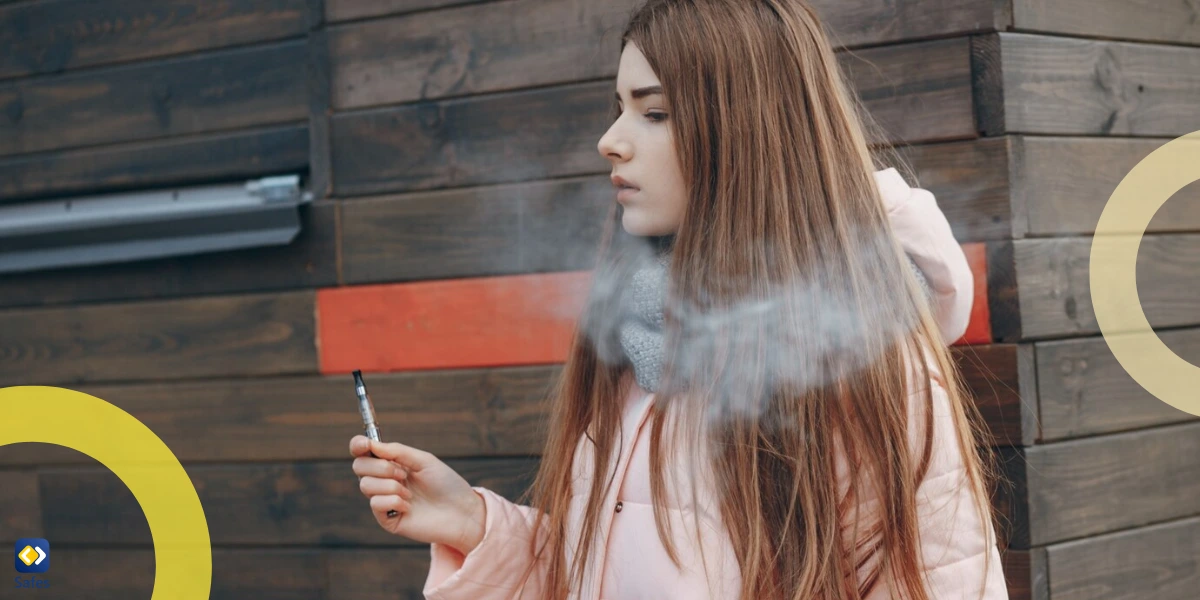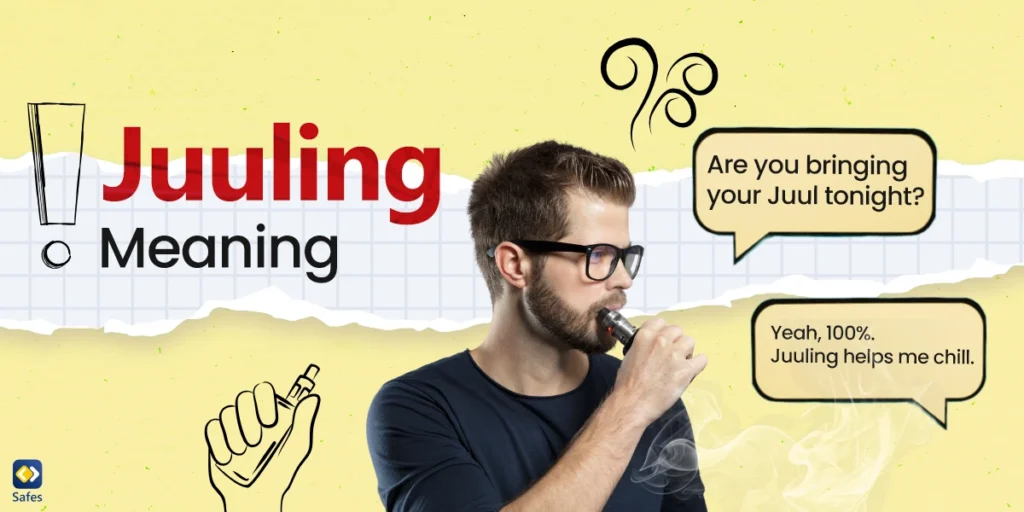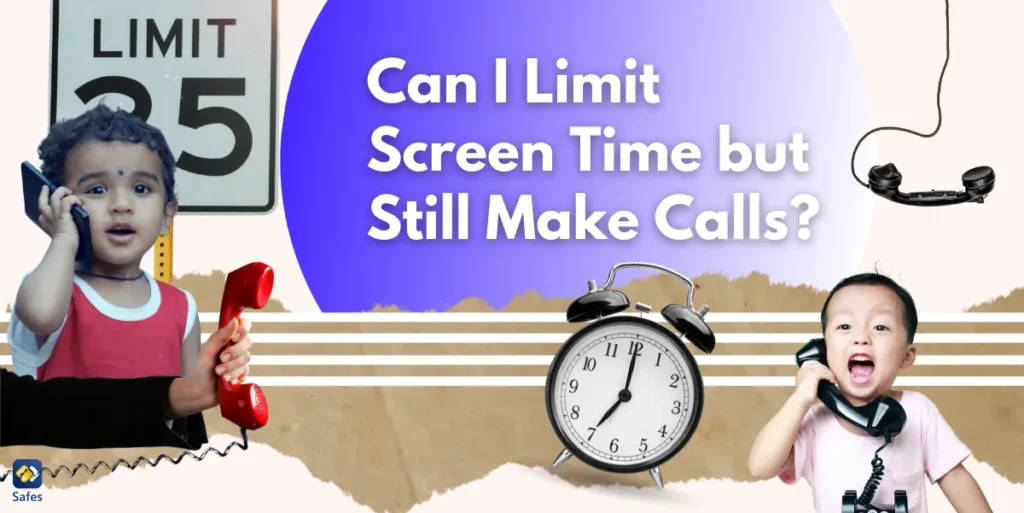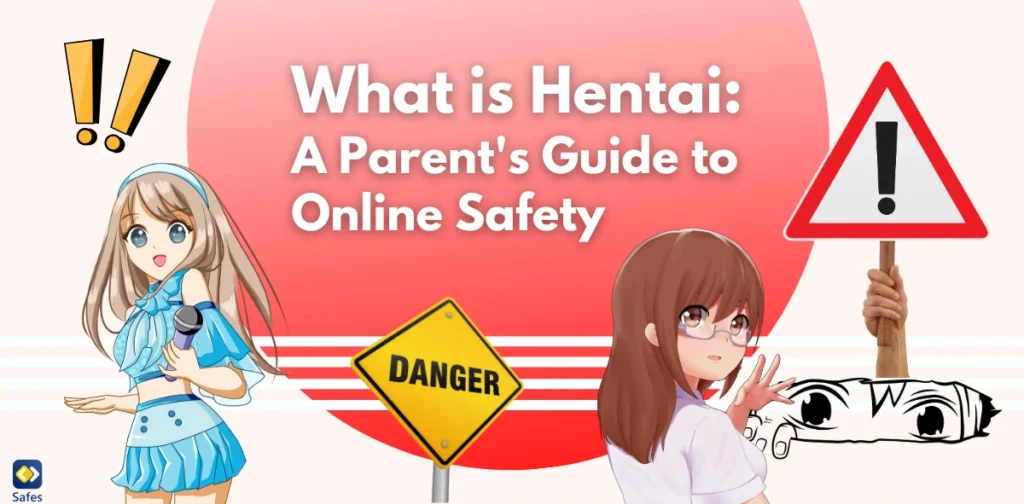What does “juuling” mean in slang? According to Urban Dictionary, “juuling” refers to the act of using a Juul brand e-cigarette or vape pen. Over time, “juuling” has become shorthand for vaping nicotine (and sometimes other substances) in discrete, handheld devices, particularly among teens and young adults. Similar to how some may casually say “I’m gonna go vape,” certain circles simply say, “I’m juuling.”
Download and Start Your Free Trial of the Safes Parental Control App
However, the story of “juuling” goes beyond just inhaling vapor—there’s a culture wrapped around its image. It’s marketed as sleek, tech-friendly, and less obtrusive than traditional smoking. In online communities, especially among youth, “juuling” evolved into a trendy term that signifies a social act as much as a personal habit. While it’s mostly associated with vaping nicotine pods, variations exist, so parents and educators should keep track of contextual clues.
What Does “Juuling” Mean in Slang?
Initially, “juuling” directly referred to using a Juul-brand vaping device, recognized for its slim, USB-like shape and flavored nicotine pods. Over time, it has branched out to mean:
- Vaping Nicotine: “I’m juuling” most commonly implies a person is inhaling nicotine vapor through a pod-based device.
- Any Form of Vaping: Some people use “juuling” generically for any kind of vaping, even if they are not using a Juul-brand product.
- Social Activity: In group chats and social media, “juuling” can take on a social component—friends might “juul” together as part of hanging out, creating a sense of bonding or shared rebellion.
Examples of how it appears in conversation:
- Expressing a Habit: “I need to cut back on juuling; my pods keep running out too fast.”
- General Vaping Term: “She’s not even using a Juul device, but she always calls it juuling.”
- Social Bonding: “Dude, meet me outside after class, we’ll juul for a bit.”
While it can be casual banter among peers, the health and legal implications make it a topic worth deeper examination.
How It’s Used in Real Digital Interactions
Today’s teens and young adults often use “juuling” in texts, social media posts, and gaming chats. While many references are harmless remarks about social habits, they can also reflect deeper issues related to nicotine dependence. Here are some platform-specific examples:
Text Message
– Friend 1: “I’m stressed about finals. Are you bringing your Juul tonight?”
– Friend 2: “Yeah, 100%. Juuling helps me chill.”
TikTok Comment Section
– Video: A teen casually showing daily routines, including taking a puff of a Juul.
– Comment: “Juuling daily? Might want to rethink that habit, bro.”
Twitter/X Post
– Tweet: “Trying out the new mango pods… not sure if it’s worth the hype.”
– Reply: “Those used to be gas, but I heard they changed the formula. Still juuling daily though!”
In these examples, “juuling” has a casual tone—part of everyday life for some. However, because “juuling” frequently implies a nicotine habit, it’s crucial for parents and educators to distinguish between fleeting slang and a more serious concern.

Concerns About Nicotine and Drug References
Not all uses of “juuling” are lighthearted. Nicotine addiction and potential health issues remain real concerns. Moreover, some individuals modify their devices to vape THC or other substances, which carries additional risks.
Potential Dangers
- Nicotine Dependence: Juul pods typically contain high levels of nicotine, which can lead to rapid addiction.
- Modified Pods: Some teens experiment with THC oil or homemade concoctions, bringing unknown health risks.
- Peer Pressure: “Juuling” can be glamorized in certain friend groups, increasing peer pressure.
Parents who see the term “juuling” in digital interactions might need to ask additional questions, especially if they notice changes in behavior or health.
Risk Level Indicator (Parent Alert System)
🔴 Red – Potential safety concerns.
“Juuling” often involves nicotine and can lead to potential addiction, health risks, or even exposure to other substances. This places it at a higher level of concern than harmless slang terms.
Points of Concern:
- Nicotine Addiction: Quick dependency due to high nicotine concentration.
- Peer Pressure: Social circles might glamorize or normalize constant use.
- Unknown Substances: Modified pods could contain THC or harmful chemicals.
While “juuling” might not always indicate dangerous behavior, parents and educators should pay attention to how frequently it shows up and in what context.
When Parents Should Intervene:
- Physical or Behavioral Changes: If your child becomes more irritable, anxious, or shows signs of dependency (e.g., headaches when not vaping), it may be time for a conversation.
- Excessive Spending: Juul pods can be expensive. Sudden requests for money or unexplained purchases could signal increased vaping activity.
- Mentions of Illegal Substances: If text messages or social media posts discuss “juuling with THC” or any suspicious substances, intervention is critical.
- School Complaints: Teachers noticing vaping at school might share concerns about classroom distractions or discipline issues.
What Parents Can Do:
Open communication and proactive steps are key. Here are some suggestions:
- Encourage Honest Dialogue
-
- Let your child know they won’t be immediately punished for admitting to trying or using Juul.
- Ask them what “juuling” means to their friends. Is it a social activity? A stress reliever?
- Discuss Health Risks
-
- Share factual information about the addictive properties of nicotine and vaping effects on teenage health.
- Talk about the difference between “juuling” for fun and developing a habit that might be hard to break later on.
- Set Boundaries
-
- If your child is a minor, establish clear rules about not using e-cigarettes.
- Use protective measures if necessary—some schools have strict anti-vaping policies.
- Use Parental Controls
-
- Parental control apps like Safes can monitor trending terms, highlight risky behaviors, and prompt earlier conversations.
- Consider setting screen time limits or content filters for social media platforms where “juuling” is glamorized.
Trend Tracker – Is It Still Relevant?
🔥 Trending – Still widely used.
Despite legal crackdowns and health campaigns, “juuling” remains prevalent in 2025. For some teens, it’s a casual stress outlet. For others, it’s a symbol of belonging or maturity. However, the rising wave of regulations and health advisories continues to shape how much “juuling” surfaces publicly.
Why It’s Still Popular:
- Discreet Design: Juul devices are compact, making them easy to conceal.
- Flavored Pods: Although some flavor bans exist, appealing flavors remain attractive to young users.
- Influence of Social Media: Trendy images and peer-driven content keep “juuling” in the digital spotlight.
Yet, growing awareness of health implications and a decline in novelty factor have somewhat dampened the hype. Online, debates about the ethics of marketing e-cigarettes to young people also persist, influencing how “juuling” is perceived.
![]()
Online Safety Considerations
Although “juuling” usually signals nicotine use, there are broader social and mental health aspects to consider:
Potential Risks
- Nicotine Addiction: Teens can become dependent quickly, potentially harming their developing brains.
- Gateway Behavior: Some experts argue that e-cigarette use can lead to experimentation with traditional cigarettes or other substances.
- Normalization of Substance Use: Repeated positive or neutral references to “juuling” may desensitize peers, making them more likely to try it.
- Legal Repercussions: In many regions, purchasing or using e-cigarettes under a certain age is illegal. Teens could face school or legal penalties if caught.
How Parents Can Address This Issue
- Teach Media & Social Media Literacy: Help teens understand that influencers or friends online may only show the “cool” side, not the health or legal risks.
- Monitor Without Overreacting: If you see “juuling” references, ask questions first. Not every mention is a crisis, but ignoring it entirely may lead to missed warning signs.
- Encourage Balanced Lifestyles: Motivate teens to cope with stress through physical activities, hobbies, or mindfulness rather than substances.
Safes: Helping Families With Online Trends
Parents concerned about the slang term “juuling” will find reassurance in parental control apps like Safes, designed to keep families informed:
- Keyword Monitoring: Alerts you if suspicious or concerning words (like “juuling”) appear in chats or searches.
- Social Media Insights: Tracks engagement on popular platforms, providing a context for your child’s digital habits.
- Content Filters: Blocks or flags content that may promote nicotine or substance use.
Ultimately, tools like Safes are not about infringing on your child’s independence but about staying informed so you can guide them effectively.
Try Safes today on iOS or Android to keep pace with the rapidly evolving world of online slang and youth culture.
Conclusion
“Juuling,” once a novel trend, remains a widely recognized slang term for vaping with Juul devices or e-cigarettes in general. It’s become part of everyday language among many teens and young adults, often appearing in group chats, TikTok videos, and even comedic references. But at its core, “juuling” typically involves nicotine consumption—a reality that raises health, legal, and social concerns.
By maintaining open lines of communication, educating teens on the potential hazards, and using practical digital monitoring tools, families can navigate the complexities of “juuling” with confidence. Recognizing how often the term pops up and examining its context are critical steps to ensure children’s well-being, both online and offline. A balanced approach—where parents stay informed but not alarmist—encourages healthier habits and fosters trust.
Your Child’s Online Safety Starts Here
Every parent today needs a solution to manage screen time and keep their child safe online.
Without the right tools, digital risks and excessive screen time can impact children's well-being. Safes helps parents set healthy boundaries, monitor activity, and protect kids from online dangers—all with an easy-to-use app.
Take control of your child’s digital world. Learn more about Safes or download the app to start your free trial today!




